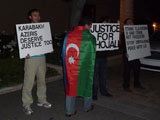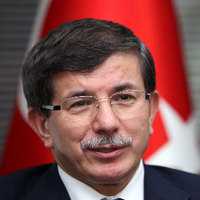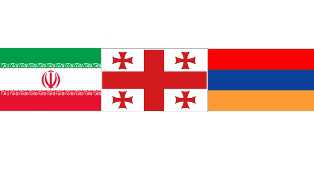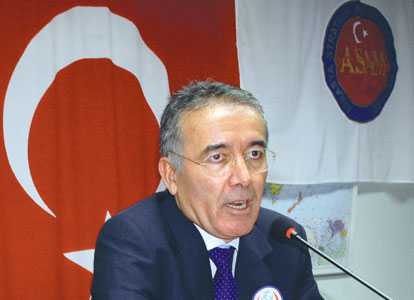
On Friday, November 19, 2010, in a first-ever Azeri-American public protest in California, a group of Azeri and Turkish community activists held a picket outside of the Pacific Club in Newport Beach, California to protest an event featuring a separatist warlord, self-proclaimed “Nagorno-Karabakh Republic (NKR) President”, Bako Sahakyan, as a speaker. The event was hosted by the World Affairs Council (WAC) of Orange County and sponsored by the Consulate General of the Republic of Armenia in Los Angeles, Armenian National Committee of America (ANCA), and other Armenian-American groups.
The picketers held up slogans demanding the return and restoration of the rights of 800,000 Azerbaijanis displaced as a result of ongoing occupation and ethnic cleansing committed by Armenian forces on Azerbaijani territories. They also distributed factsheets with references on the conflict from U.S. and international sources to visitors at the event venue entrance.
In addition, a group of 10 Azeri- and Turkish-American community activists attended the speech by Bako Sahakyan inside the Pacific Club. Introducing the speaker was the Consul General of Armenia, Grigor Hovhannissian, who talked about the “heroic” achievements of “NKR” on a path towards self-determination. It is noteworthy, that the Republic of Armenia does not recognize the illegitimate “NKR” due to the claimed commitment to peace negotiations under the OSCE Minsk Group format. Yet high-level Armenian diplomats in the United States not only participate, but also sponsor a visit by so-called “NKR President”. Such actions manifest a clear disrespect to the Nagorno-Karabakh peace process and its mediating OSCE Minsk Group co-chairs.
Taking the stage over next, Bako Sahakyan expressed his excitement over recent decision on the legality of Kosovo independence by the International Court of Justice (ICJ), which in his opinion, will increase prospects for “NKR” to be independent as well. Sahakyan also reiterated the necessity of including “NKR” as a party in the negotiation process, repeatedly criticizing Azerbaijan’s opposition to it.
He failed to recall, however, that the 1992 Baker Rules (named after then-U.S. Secretary of State James Baker) laid out the current OSCE peace negotiation format, with Armenia and Azerbaijan as “principal” and Nagorno-Karabakh’s ethnic Armenian and Azeri communities as “interested” parties to conflict.
After the speech, during the Q&A session, Mr. Sahakyan was confronted with several questions from Azerbaijani visitors and publicly demonstrated further lack of any understanding of conflict history, settlement process, providing completely incoherent and irrelevant answers.
Asked to comment on his authority to represent “the people of Nagorno-Karabakh”, while third of those were Azeris ethnically cleansed from their homes, Bako Sahakyan said that the engagement of Karabakh’s Azeri community is possible only if “NKR” is recognized as an equal party to the conflict. Armenian separatist did not explain, however, what prevents him from engaging with Azeri community of Karabakh within the OSCE defined format of an “interested” party. Instead Mr. Sahakyan repeated the old counterproductive slogan that it is impossible for Karabakh to be part of Azerbaijan.
Asked to comment on the words of Armenian President Serzh Sargsyan about the 1992 Khojaly Massacre (“before Khojali, the Azerbaijanis thought that they were joking with us, they thought that the Armenians were people who could not raise their hand against the civilian population. We were able to break that [stereotype].” (Thomas de Waal. Black Garden: Armenia and Azerbaijan through Peace and War, NYU Press, 2004)) – Armenian separatist warlord went on to deny the Armenian responsibility [for the massacre] already acknowledged by Human Rights Watch, Armenia’s “national hero” Monte Melkonian and even the incumbent President of Armenia. Claiming that he knows the “crux of the matter” and that Azerbaijan is using Khojaly Massacre as leverage against the recognition of “1915 Armenian Genocide”, Mr. Sahakyan failed to answer the posed question honestly and coherently.
The real “pearl” of Bako Sahakyan speech came at the end of Q&A session, when he was asked to comment on the impact of Azerbaijan’s growing military budget on the fate of illegitimate “NKR” entity. Choking on his own invention of “Azerbaijan-Karabakh conflict”, Mr. Sahakyan misfired that Armenian Armed Forces (and not so-called “NKR forces”) are ready to defend it in case of a possible war.
During the past week, the board directors of Azerbaijani-American Council (AAC) and other Azeri-American groups addressed their concern to the World Affairs Council of Orange County with an appeal to cancel this presentation by Bako Sahakyan. We regret that the WAC-OC leadership did not listen to these recommendations, instead proceeding with an event that did not produce any useful outcome in terms of either knowledge or conflict resolution, instead focusing on repeated dissemination of ethnocentric and irredentist views of the speaker.
http://www.today.az/news/vdiaspora/76922.html
 The occupation of Azerbaijani territories may lead to unexpected problems, Turkish President Abdullah Gul said at a joint press conference with Doris Leuthard, President of Swiss Confederation, in Bern on Thursday, Anadolu agency reports.
The occupation of Azerbaijani territories may lead to unexpected problems, Turkish President Abdullah Gul said at a joint press conference with Doris Leuthard, President of Swiss Confederation, in Bern on Thursday, Anadolu agency reports.





